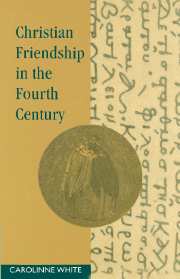Book contents
- Frontmatter
- Contents
- Preface
- Abbreviations
- 1 Introduction
- 2 Classical theories of friendship
- 3 Some problems of Christian friendship
- 4 Friendship in the lives and thought of Basil and of Gregory of Nazianzus
- 5 John Chrysostom and Olympias
- 6 Synesius of Cyrene
- 7 Ambrose of Milan – Ciceronian or Christian friendship?
- 8 St Jerome
- 9 Paulinus of Nola
- 10 Monasticism and friendship
- 11 St Augustine
- Conclusion
- Notes
- Editions and translations of primary sources
- Select bibliography
- Index
5 - John Chrysostom and Olympias
Published online by Cambridge University Press: 06 July 2010
- Frontmatter
- Contents
- Preface
- Abbreviations
- 1 Introduction
- 2 Classical theories of friendship
- 3 Some problems of Christian friendship
- 4 Friendship in the lives and thought of Basil and of Gregory of Nazianzus
- 5 John Chrysostom and Olympias
- 6 Synesius of Cyrene
- 7 Ambrose of Milan – Ciceronian or Christian friendship?
- 8 St Jerome
- 9 Paulinus of Nola
- 10 Monasticism and friendship
- 11 St Augustine
- Conclusion
- Notes
- Editions and translations of primary sources
- Select bibliography
- Index
Summary
Another Greek-speaking Christian, whose life (347?–407) spans the decisive period which saw the strengthening of Christianity but the gradual dissolution of the Roman Empire, was John Chrysostom. As bishop of Constantinople for about seven years he lived through a period of great political, social and religious turbulence in the eastern capital during the first years of the fifth century, a time of conflict and change witnessed also by Synesius during the two years he spent there. Of all the events and relationships experienced by Chrysostom in his dramatic life, I have chosen to concentrate on just one friendship in order to gain some idea of his view of the possibility and nature of Christian friendship. This was the friendship, based on a shared and whole-hearted devotion to the service of Christ, which developed at Constantinople between him and a woman, the wealthy and high-born lady Olympias, during the last years of his life and which continued until his death. The source of our knowledge of this relationship is largely restricted to the seventeen surviving letters which Chrysostom wrote to Olympias during his exile and enforced travels through what is now eastern Turkey leading to his death in 407. This inevitably provides a partial view of their relationship, dominated as it was at this time by his loneliness, depression and suffering and sheds an unusual light on a man who is primarily remembered as the brillant preacher in the churches of his native Antioch and then as the powerful bishop of Constantinople, the stern proponent of the ascetic life, the critic of luxury and corruption and the prolific writer, for which he is honoured as a Doctor of the Church.
- Type
- Chapter
- Information
- Christian Friendship in the Fourth Century , pp. 85 - 97Publisher: Cambridge University PressPrint publication year: 1992



